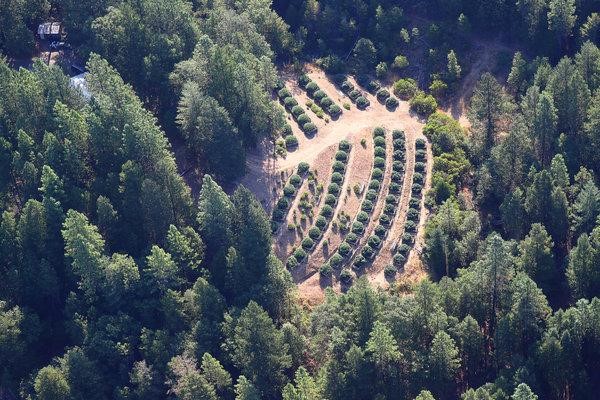 Another erroneous claim made by drug advocates is: “The law just creates a black market”.
Another erroneous claim made by drug advocates is: “The law just creates a black market”.
In areas where marijuana has been legalised, the evidence is overwhelming as to how misleading this claim is.
Organised criminal syndicates and gangs adapt to changing political and economic environments, because their ultimate goal is not to break the law but to commercialise and exploit human nature. It’s about the money. And as marijuana is the most widely used drug in the world, it is unlikely to decrease any associated criminal activity.
Narcotics officers in Colorado have been busy responding to the 50% increase in illegal grow operations across rural areas in the state. Legalisation has made it easier for the black market to thrive in rural areas due to the difficulties involved in distinguishing between legal and criminal marijuana farms.
“Colorado has a booming black market.”
U.S. Attorney for District of Colorado Bob Troyer – September 2018
Oregon has been a hub of black-market activity since legalisation.
Referring to the experience in California, the New York Times warns,
“Despite all of the innovation and energy in the legalized market, the black market is still dominant. Only around 3 percent of marijuana farmers in the (California) state have obtained licenses… The problem is that regulated marijuana, which is subject to testing, taxes and many other regulations — as it will be in Canada — costs significantly more than pot grown and sold on the black market. As long as there is onerous regulation and taxation imposed on the legal market, you can forget about getting rid of the illicit market.”
 A report from the credit rating agency Fitch Ratings in October 2017 said that high taxes on legal marijuana in California could have the potential to turn many consumers away from the state’s cannabis shops and toward the black market.
A report from the credit rating agency Fitch Ratings in October 2017 said that high taxes on legal marijuana in California could have the potential to turn many consumers away from the state’s cannabis shops and toward the black market.
California’s projected marijuana tax revenue by July 2019 is nearly half of what was originally expected when the state began retail sales in 2018, since most consumers continue to purchase marijuana from the black market in order to avoid high taxes (Blood, 2019; Fuller, 2019). Now, members of California’s cannabis industry are sending an S.O.S. to the state capitol, saying they’re struggling to compete against black market operators who don’t have to meet stringent regulations or pay taxes and fees. They’re urging leaders to make swift regulatory changes or risk the collapse of their emerging industry.
Well-known NZ commentator Rosemary McLeod says;
“Underpinning such experiments around the world is a belief that criminal gangs will quietly accept losing their markets, and give up illegal dealing. There’s a fantasy for you….”
The black market is appearing in Canada. A Radio-Canada investigation revealed that the financial backers of some producers have links to organized crime. Anti-drug politicians said “it’s a troubling sign that, two weeks into the era of legal cannabis, the black market appears to have infiltrated Canada’s legal supply chain.” The New York Times recently commented; “Taming an illegal trade estimated at 5.3 billion Canadian dollars is proving to be daunting. Many of the products sold at Weeds, Glass and Gifts are banned under the new law, which restricts licensed retailers to selling fresh or dried cannabis, seeds, plants and oil. Yet the retailer’s owner has no intention of shutting down his four Vancouver stores or changing his product lineup. “The government taking over the cannabis trade is like asking a farmer to build airplanes.”
Canadian government survey results released February 2020 found that 40% of the country’s marijuana consumers admit to having obtained the drug illegally since legalisation. Statistics Canada, a state agency, reports that just 29% of cannabis users buy all of their product from a legal source. At the end of 2019, Canada’s UCP (Alberta) budget projected that cannabis income will remain negative over the next four years, despite previous estimates it would make the province money by 2020. After a year of legalisation, it appears the black market cannabis industry is still thriving since it isn’t subject to legal sector demands.
“In Illinois, where recreational pot sales just got underway at the first of the year, cannabis patrons are a little miffed over how much it costs to catch a buzz. And, honestly, it’s a legitimate gripe. The tax scheme is a bit nutty. Not only does Illinois tax its growers to the tune of 7 percent, but it is also sucking out multiple excise taxes depending on the type of pot product a person buys. They want 10 percent for flower, 20 percent for edibles and beverages, and 25 percent for any product that comes packed with over 35 percent THC. Oh yeah, Illinois pot customers must also contend with state and local taxes. So, in many cases, customers are paying 30 percent extra at the cash register. And, make no mistake about it, they are crying about it too.”
Rocky Mountain PBS
Published on Dec 11, 2018
The investigative team analyzes state and federal data to explore whether the black market for marijuana is growing in Colorado. And Insight explores the state’s unique link to Florida when it comes to illegal marijuana. Also, who is being arrested at the grow sites? It might not be who you would expect!
California faces weed apocalypse as stricter rules go in to effect
